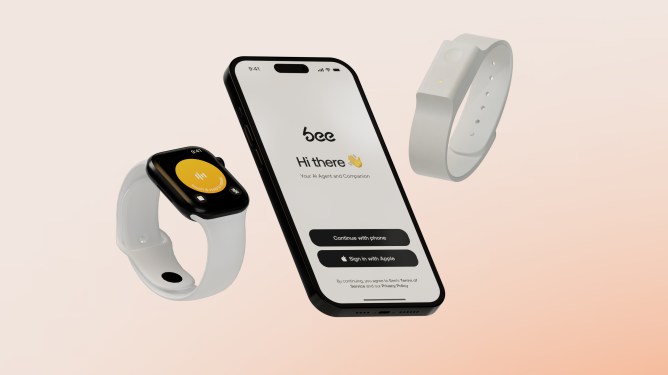Amazon has acquired the AI wearables startup Bee, according to a LinkedIn post by Bee co-founder Maria de Lourdes Zollo. Amazon has confirmed the acquisition to TechCrunch but noted that the deal has not yet closed.
Bee raised $7 million last year and produces both a stand-alone Fitbit-like bracelet, which retails for $49.99 plus a $19-per-month subscription, and an Apple Watch app. The product is designed to record everything it hears unless the user manually mutes it. Its main goal is to listen to conversations in order to create reminders and to-do lists for the user.
Last year, Zollo told TechCrunch that the company envisions creating a “cloud phone”—a mirror of your smartphone that would give the personal Bee device access to user accounts and notifications. This would allow the device to send reminders about events or even messages on the user’s behalf.
According to Bee, their mission is to provide everyone access to a personal, ambient intelligence that feels less like a mere tool and more like a trusted companion—one that helps users reflect, remember, and navigate their daily lives more freely.
Other companies, such as Rabbit and Humane AI, have attempted to develop AI-enabled wearables but have so far struggled to find significant success. Bee’s $50 price point makes its devices much more accessible to curious consumers who may be hesitant to make a large financial commitment. For comparison, the now-defunct Humane AI Pin was priced at $499.
An Amazon spokesperson stated that Bee employees have received offers to join Amazon. This acquisition highlights Amazon’s growing interest in developing wearable AI devices, diverging from its existing line of voice-controlled home assistants like Echo speakers. At the same time, ChatGPT maker OpenAI is reportedly working on its own AI hardware, while Meta is integrating AI into its smart glasses. Apple is also rumored to be developing AI-powered smart glasses for a potential 2026 launch.
As with other AI wearables that continuously record surroundings, privacy and security concerns are significant. Different companies adopt varying policies regarding how voice recordings are processed, stored, and used in AI training. Currently, Bee’s privacy policy states that users can delete their data at any time, and that audio recordings are not saved, stored, or used for AI training. However, the app does store data that the AI learns about its user to function effectively as an assistant.
Bee previously indicated that it plans to only record the voices of people who have given verbal consent. The company is also working on features that allow users to set boundaries—based on topics or location—that would automatically pause the device’s learning. Bee intends to incorporate on-device AI processing, which generally poses fewer privacy risks than cloud-based data processing.
It remains uncertain whether these privacy policies will change once Bee is integrated into Amazon, a company with a mixed track record on handling user data. In the past, Amazon has shared footage from personal Ring security cameras with law enforcement without owners’ consent or a warrant. Furthermore, Ring settled Federal Trade Commission claims in 2023 after it was revealed that employees and contractors had broad and unrestricted access to customer videos.
This acquisition places Amazon in the competitive AI wearables space with a product that emphasizes accessibility and convenience but also raises critical questions about privacy and data security as the technology advances.

